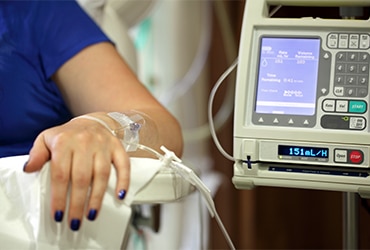Lowering Infection Risk During Multiple Myeloma Treatment
Intravenous delivery of antibodies may lower the risk of severe infections by 90% in patients with multiple myeloma, a recent study found.

The risk of serious infection among patients receiving a new type of treatment for multiple myeloma may be reduced up to 90 percent by supplementing their antibody levels through intravenous delivery of immunoglobulins (IVIg), according to a study published in Blood Cancer Discovery, a journal of the American Association for Cancer Research.
“This study demonstrates that IVIg is associated with a substantially reduced risk of serious infections in patients receiving anti-BCMA bispecific antibodies,” said Guido Lancman, MD, senior author of the study. “Given the very high rates of serious infections and deaths in patients receiving these treatments, this study supports a proactive rather than a reactive approach, meaning initiation of IVIg prophylaxis from the beginning rather than waiting for patients to experience complications.”
The analysis was conducted among patients receiving a type of immunotherapy that targets the BCMA protein, which tends to be overexpressed on malignant plasma cells found in multiple myeloma (MM).
The treatment uses an anti-BCMA “bispecific” antibody to help stimulate the patient’s immune system to fight MM, which is a form of cancer. Two such therapeutics have recently been approved by the U.S. Food and Drug Administration to treat MM.
While anti-BCMA bispecific antibodies have exhibited impressive effectiveness in patients who have already received more conventional therapies, a high frequency of serious and sometimes lethal infections has also been observed in patients, explained Lancman, a clinical associate at the Princess Margaret Cancer Centre of the University Health Network in Toronto and an adjunct assistant professor at the University of Toronto.
Prior research from Lancman and colleagues suggested that the increased risk of infection during anti-BCMA therapy may be caused by treatment-induced depletion of the patient’s own antibodies.
“Since antibodies are key components of the immune response, the inability to make antibodies leaves patients vulnerable to all sorts of viral and bacterial infections,” he noted.
Physicians sometimes give patients intravenous infusions of antibodies, also known as immunoglobulins, to help boost their immune system.
Lancman and colleagues found that the rate of severe infection was 90 percent lower during times when patients were receiving the intravenously administered immunoglobulins (IVIg) as compared to when they were not receiving IVIg, Lancman said. No other significant risk factors for infection were found in this study.
The findings came from a retrospective analysis of 37 patients with heavily pre-treated multiple myeloma who had received treatment with an anti-BCMA bispecific antibody. Among 26 patients who experienced clinical responses to the treatment, 92% had received IVIg at some point during treatment. All patients were enrolled in one of four clinical trials at Mount Sinai Hospital between 2019 and 2022.